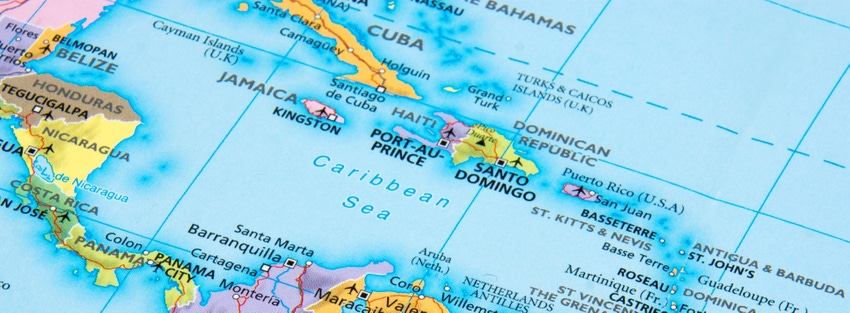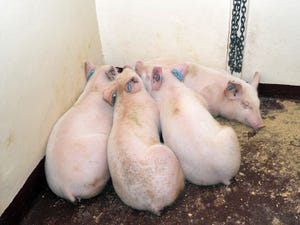ASF battle continues in Dominican Republic, Haiti
APHIS providing boots on the ground support in African swine fever eradication efforts in Hispaniola.

The last time Hispaniola battled African swine fever it took two years to complete eradication. It cost the Dominican Republic $15 million, while Haiti paid $24 million in expenses. Both countries were forced to sacrifice well over a million animals.
"There was a lot of trauma, within communities, with producers and those who are involved in raising swine," says Amy Delgado, director of the USDA Animal and Plant Health Inspection Service Center for Epidemiology and Animal Health. "At the time the military was very involved in this program and so there were a lot of scars left behind by taking this approach, but it was very successful in that they were able to eradicate the disease."
When the disease was re-introduced and discovered in 2021, APHIS already had boots on the ground in both countries and was able to rapidly provide expertise and diagnostics. They also began to collaborate with other international organizations under the global framework for trans-boundary animal diseases, Delgado says.
Because biosecurity is extremely challenging and it's been difficult to clean and disinfect the small swine production units in the Dominican Republic, restocking farms has taken well over a year, she says.
"There's been kind of varying approaches to backyard type swine producers just because of the concerns around this disease itself," says Delgado.
After about a year of working on eradication efforts in the Dominican Republic, APHIS began to really assess the progress, Delgado says. Surveillance and control activities had been somewhat limited and there were a lot of political complexities to the response.
"Based on those outcomes we ended up deciding late last year to pivot and refocus looking at establishing structures and processes to support a program that will be in place for a while to ensure progress, so we don't have a change in our goals or objectives and we're going to continue to focus on ensuring that the virus does not spread to other countries," Delgado says.
Outbreaks were regularly reported to the World Organization for Animal Health over the first nine months for Haiti and the first year of the outbreak for the Dominican Republic.
"Even in that short amount of time this disease had basically spread everywhere and those areas that don't have cases are probably because they just hadn't gone and looked," Delgado says. "Most of the reporting on the Dominican Republic side was through passive reporting of sick pigs and dying pigs. In Haiti they were actually sending out teams to sample and collect small batches of samples from all these different areas to try and understand where the disease was, but it spread very quickly to all parts of the island."
The Dominican Republic continues to have "some pretty hot areas of disease spread and high numbers of caseloads in areas with high densities of pigs," she says.
"The outbreak is still ongoing, they are still experiencing a number of cases every week and still certainly experiencing a lot of production losses," says Delgado.
In its latest estimates, the USDA Foreign Agricultural Service found that with nationwide control and eradication efforts ongoing, swine production in the Dominican Republic fell by 28% year-over-year in 2022 and an additional 9% decline is projected in 2023. The U.S. Meat Export Federation estimates that the country's self-sufficiency in pork production decreased from 61% in 2020 to just 32% in 2022.
"While we have been able to export a lot of U.S pork to the Dominican Republic, it's certainly a concerning reminder of what this disease can do to a country and a production system," Delgado says.
APHIS has been focusing on seven key areas to support the country's eradication:
Biocontainment
Laboratory diagnostics
Surveillance design and implementation
Incident command
Biosecurity
Movement controls
Compensation
"Biosecurity remains a huge challenge," Delgado says. "Movement controls, again another area that is really difficult. They have movement controls during certain working hours but everybody kind of goes home at a certain time of day, and it becomes really hard to prevent animals moving."
In terms of compensation, APHIS has been working with them to make sure their indemnity program compensates producers for early reporting and participation in disease response and control.
Unfortunately, the situation in Haiti is even worse, she says.
"It's a really tough place as the situation in Haiti right now politically is very complex," says Delgado. "ASF is not their top priority, and the country is facing a myriad of other issues. The U.S. government is engaged with Haiti on a number of fronts with what they're facing, and I will say it's very difficult to move around the country due to the lack of security and many parts of the country are run by gangs and so even the Haitian officials are not able to move around and go out and sample pigs or deal with pigs that are dying."
APHIS continues to provide sampling supplies and testing support for Haiti. They have also worked with them on some biocontainment activities, investing in incinerators for ports and airports.
While APHIS has made some inroads in the country, Delgado says the situation is still challenging.
"I do think we are going to be fighting with this disease there for quite some time to come," Delgado says.
About the Author(s)
You May Also Like





